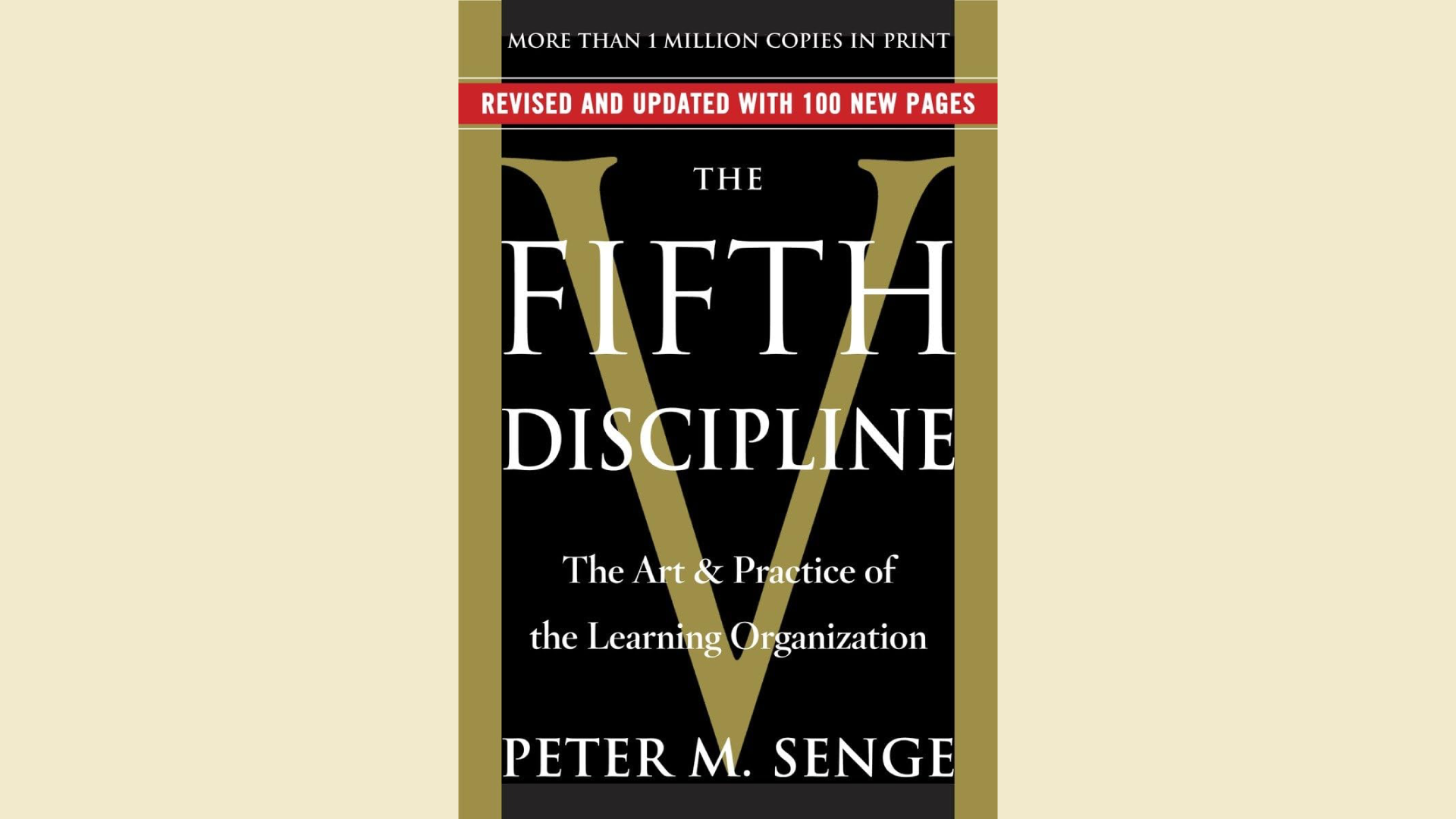Summary: The Fifth Discipline by Peter Senge

Welcome, entrepreneurs, to the world of organizational learning! In our fast-paced, ever-changing business landscape, adapting and innovating is paramount. One of the most influential frameworks in this realm is Peter Senge’s “The Fifth Discipline,” which outlines five key disciplines essential for building a learning organization. In this blog post, we’ll delve into each discipline, providing practical insights to help you harness their power and drive success in your entrepreneurial journey.
Meet the Author: Peter Senge
Peter Senge is a renowned scholar, author, and lecturer in organizational learning and systems thinking. Born in 1947, Senge has dedicated his career to understanding how organizations can thrive in an increasingly complex world. He holds a Ph.D. in Management from the Massachusetts Institute of Technology (MIT) and is currently a Senior Lecturer.

Senge’s seminal work, The Fifth Discipline, has been translated into over 20 languages and sold millions of copies worldwide since its publication in 1990. The book has profoundly impacted management thinking, inspiring industry leaders to adopt a more holistic and systemic approach to organizational change.
In addition to his work as an author, Senge is also the founder of the Society for Organizational Learning (SoL), a global community of organizations, researchers, and practitioners dedicated to advancing the theory and practice of organizational learning.
Senge has received numerous awards and honors throughout his career for his management and organizational development contributions. He continues lecturing, consulting, and writing, sharing his insights and expertise with organizations worldwide.
1. Systems Thinking:
Systems thinking involves understanding the interconnectedness of various elements within your business ecosystem. It’s about seeing the big picture and recognizing how actions in one area can impact others.
Practical Tip: Map out your business processes and relationships to identify feedback loops and leverage points. Consider the broader system effects of your decisions to anticipate and mitigate unintended consequences.
“People don’t resist change. They resist being changed!” - Peter Senge
2. Personal Mastery:
Personal mastery is the discipline of continuous self-improvement and growth. It’s about clarifying your vision, honing your skills, and staying committed to lifelong learning.
Practical Tip: Define your personal and professional goals with clarity and specificity. Cultivate a growth mindset, embracing challenges as opportunities for learning and development.
“The heart of the matter is always about the human spirit - how it is nurtured, celebrated, and set free.” - Peter Senge
3. Mental Models:
Mental models are the underlying beliefs and assumptions that shape perceptions and behaviors. They influence how you interpret information and make decisions.
Practical Tip: Challenge your assumptions and question the validity of your beliefs. Seek out diverse perspectives to broaden your understanding and overcome cognitive biases.
“The bad leader is he who the people despise. The good leader is he who the people praise. The great leader is he who the people say, ‘We did it ourselves.’” - Peter Senge
4. Shared Vision:
A shared vision aligns and inspires individuals within your organization toward a common purpose. It provides clarity of direction and motivates coordinated action.
Practical Tip: Involve your team in co-creating the vision to foster buy-in and commitment. Communicate the vision effectively, emphasizing its significance and relevance to each team member.
“Shared vision not only inspires people and makes coordination easier, it also gives something for people to hang on to in the rough waters of change.” - Peter Senge
5. Team Learning:
Team learning harnesses your team's collective intelligence and capabilities to achieve shared goals. It requires open communication, trust, and a culture of continuous improvement.
Practical Tip: Create a psychologically safe environment where team members feel comfortable expressing ideas and taking risks. Encourage diversity of thought and constructive feedback to stimulate innovation and learning.
“Learning organizations are where people continually expand their capacity to create the results they truly desire, where new and expansive patterns of thinking are nurtured, where collective aspiration is set free, and where people are continually learning how to learn together.” - Peter Senge
As entrepreneurs, mastering the five disciplines of organizational learning is your ticket to sustainable success in a dynamic business landscape. By embracing systems thinking, personal mastery, challenging mental models, fostering a shared vision, and promoting team learning, you’ll cultivate an adaptive, innovative, and resilient organization poised for greatness. So, go forth, apply these principles with confidence, and watch your entrepreneurial endeavors thrive!
Feel free to share your thoughts or experiences with organizational learning and how you plan to implement these disciplines in your entrepreneurial journey!

Guide for building a learning organization using The Fifth Discipline
Transforming your organization into a learning powerhouse isn’t just about theory—it’s about practical action. Drawing from Peter Senge’s “The Fifth Discipline,” we’ve crafted a hands-on guide to help you turn theory into reality. Prepare to roll up your sleeves and embark on an organizational growth and innovation journey.
Step 1: Systems Thinking Workshop
Activity: Host a systems thinking workshop with key stakeholders.
Objective: Map out your organization’s systems and processes on a whiteboard or large paper.
Task: Identify feedback loops, delays, and interconnected elements.
Outcome: Gain a holistic understanding of how your organization functions and where opportunities for improvement lie.
Step 2: Personal Mastery Challenge
Activity: Launch a personal mastery challenge among team members.
Objective: Encourage individuals to set personal learning goals aligned with organizational objectives.
Task: Each participant identifies one skill or competency they want to develop and creates a plan to achieve it.
Outcome: Cultivate a continuous learning and self-improvement culture while addressing specific skill gaps within the organization.
Step 3: Mental Models Audit
Activity: Conduct a mental models audit with cross-functional teams.
Objective: Surface and challenge limiting beliefs and assumptions.
Task: Facilitate open discussions where team members share their mental models of key business processes or challenges.
Outcome: Identify common patterns of thinking that may hinder innovation or collaboration and develop strategies to overcome them.
Step 4: Visioning Workshop
Activity: Facilitate a visioning workshop with diverse stakeholders.
Objective: Co-create a compelling shared vision for the organization.
Task: Engage participants in envisioning the organization's desired future state and articulating core values and aspirations.
Outcome: Develop a shared understanding of the organization’s purpose and direction, fostering stakeholder alignment and commitment.
Step 5: Team Learning Sprint
Activity: Kick off a team learning sprint focused on a specific challenge or opportunity.
Objective: Foster collaboration, experimentation, and knowledge sharing among team members.
Task: Form cross-functional teams to tackle a real-world problem or explore a new market opportunity.
Outcome: Encourage rapid prototyping, feedback loops, and reflection to drive innovation and learning while delivering tangible results.
Conclusion:
By embracing practical, activity-based approaches inspired by “The Fifth Discipline,” you can ignite a culture of learning and innovation within your organization. From systems thinking workshops to team learning sprints, each step empowers your team to learn, adapt, and thrive in today’s dynamic business environment. So, gather your team, roll up your sleeves, and embark on this transformative journey together!
